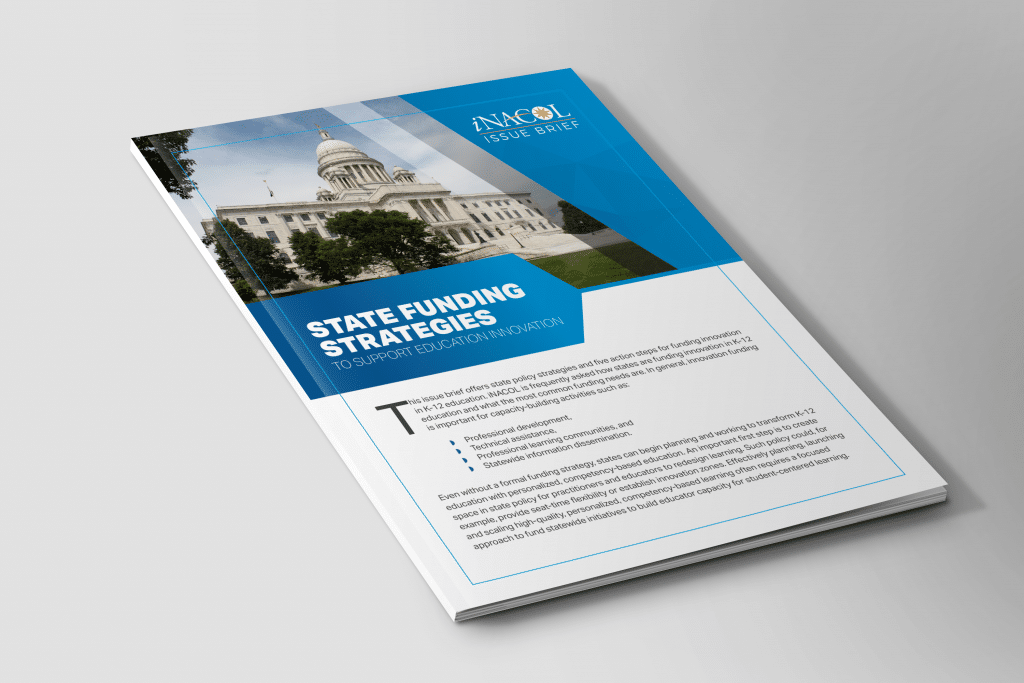How States Are Funding Innovation in Education and Supporting Steps for Policymakers
Education Domain Blog
 One of the most frequent questions district leaders and state policymakers ask of us is how other states are funding the capacity needed to support the transformation to innovative models of personalized, competency-based education.
One of the most frequent questions district leaders and state policymakers ask of us is how other states are funding the capacity needed to support the transformation to innovative models of personalized, competency-based education.
To that end, today we’ve published a new issue brief, State Funding Strategies to Support Education Innovation, describing how eight states have approached funding innovation in K-12 education. In addition, we offer state policymakers five action steps to fund state-level capacity-building activities for personalized, competency-based learning.
To realize the goal of education system transformation, a sustained commitment to investing in innovation is critical. Innovation funding can provide for important capacity-building activities such as:
- Professional development,
- Technical assistance,
- Professional learning communities, and
- Statewide information dissemination.
State Strategies
The issue brief chronicles the approaches undertaken by leaders in Vermont, New Hampshire, Rhode Island, Arkansas, South Carolina, Utah, Idaho and Georgia to support innovation and capacity-building for personalized, competency-based learning. Their paths to establishing effective funding strategies are offered as examples for other states that wish to follow their lead.
Vermont, for example, began with comprehensive state policies that lay the groundwork for student-centered learning statewide. The Vermont Agency of Education repurposed state funds to support professional development for personalized learning through a series of seminars, as well as through a statewide learning network. The state education agency also realigned its internal structures, creating four school support teams to help schools with various aspects of personalized, proficiency-based education. These activities have allowed the state agency to support the work of scaling student-centered learning without an appropriation dedicated for this purpose.
Utah, on the other hand, began its journey with a relatively small but dedicated state appropriation for a pilot program that sent school leaders from 14 schools on a learning tour of the more advanced models of personalized, competency-based school models in and out of the state. The state plans to issue guidance to other districts in the state on how to make the transition to competency-based education, in case they want to transition to competency-based education as well. The Utah State Board of Education will create a grant program that allows schools to seek funding to plan, and later implement, personalized, competency-based education.
To learn more about other states approached this work, as well as the Federal funding opportunities that states can access as part of an overall funding strategy, download the issue brief.
Action Steps
The path laid by the states highlighted in the issue brief are instructive for state policymakers as they consider how to develop sustainable funding plans for personalized, competency-based education. We recommend a number of initial steps to set the right conditions, including:
- Learning from other states about how they are funding innovation pilots, learning communities, professional development, technical assistance and other state initiatives to build capacity for transformation;
- Engaging districts, communities and state stakeholders to identify the areas where funding is needed to increase capacity;
- Identifying existing funding sources that could be repurposed for capacity building;
- Assessing the funding levels needed, the funding targets and the purposes and uses of those funds; and
- Developing a diverse, cross-disciplinary working group to study national and international approaches to school finance and funding formulas to align with student-centered learning models and ensure equitable funding for all students.
For more information, download the iNACOL issue brief, State Funding Strategies to Support Education Innovation, and access related issue briefs here:
- Rethinking State Accountability to Support Personalized, Competency-Based Learning in K-12 Education
- Redefining Student Success: Profile of a Graduate
- State Policy & K-12 Competency-Based Education
- Redesigning Systems of Assessments for Student-Centered Learning
- State Strategies to Develop Teacher Capacity for Personalized, Competency-Based Learning
Learn more:
- Foundation for Excellence in Education ‒ Competency-Based Education & School Finance
- Center for Innovation in Education ‒ Low-Stakes Completion-Based Funding: A New Approach to Financing Competency-Based Education
- Getting Smart ‒ 4 Ways We Can Fund Personalized Learning to Create More Equitable Schools
- iNACOL ‒ Current to Future State: Issues and Action Steps for State Policy to Support Personalized, Competency-Based Learning
- CompetencyWorks ‒ Fit for Purpose: Taking the Long View on Systems Change and Policy to Support Competency Education
- CompetencyWorks ‒ Reaching the Tipping Point: Insights on Advancing Competency Education in New England
- Follow us on social media: @nacol, @SusanDPatrick, @mariaworthen, @DaleKFrost